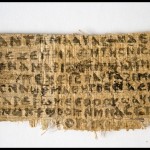Newly Discovered Gospel Suggests Jesus Had a Wife
A Harvard historian has identified a faded, fourth-century scrap of papyrus she calls "The Gospel of Jesus's Wife." One line of the torn fragment of text purportedly reads: "Jesus said to them, 'My wife …'" The following line states, "she will be able to be my disciple."
The finding was announced to the public today (Sept. 18) by Karen King, a historian of early Christianity, author of several books about new Gospel discoveries and the Hollis professor of divinity at Harvard Divinity School. King first examined the privately owned fragment in 2011, and has since been studying it with the help of a small group of scholars.
According to the New York Times, King and her collaborators have concluded that the business card-size fragment is not a forgery, and she is presenting the discovery today at a meeting of International Congress of Coptic Studies in Rome.
The fragment, written in Coptic, the language of a group of early Christians in Egypt, has an unknown provenance, and its owner has opted to remain anonymous. Questions about the fragment abound, but scholars say it will nonetheless reignite several old debates: Was Jesus married? If so, was Mary Magdalene his wife? And did he have a female disciple?
Scholars say these controversies date to the early centuries of Christianity, but they remain relevant today. In the Roman Catholic Church, for example, women and married men are barred from priesthood because of the model thought to have been set by Jesus.
King has cautioned that the new discovery should not be taken as proof that Jesus was actually married. The text appears to have been written centuries after he lived, and all other early Christian literature is silent on the question of his marital status.
But the scrap of papyrus – the first known statement from antiquity that refers to Jesus speaking of a wife – provides evidence that there was an active discussion among early Christians about whether Jesus was celibate or married, and which path his followers should choose, King told the Times.
"This fragment suggests that some early Christians had a tradition that Jesus was married," King said. "There was, we already know, a controversy in the second century over whether Jesus was married, caught up with a debate about whether Christians should marry and have sex."
The significance of this fragment was known by scholars previously, and then forgotten. When its current owner acquired it in a batch of papyri in 1997 from its previous owner, a German, it came with a handwritten note. The note cited a now-deceased professor of Egyptology in Berlin as having called the fragment "the sole example" of a text in which Jesus claims a wife.
